- Home
- Andy Andrews
The Final Summit Page 8
The Final Summit Read online
Page 8
To David and the audience, Winston finished in full voice. “Hope! Joan of Arc lived it, and now, I believe, she has provided the answer to our question. How will humanity restore itself to the pathway toward successful civilization? By restoring hope in one another! By restoring hope in the future! By restoring hope in humanity itself! Hope! Hope!”
The theater erupted in applause, standing, surprising Winston, David, and Joan, who were nonetheless happy that everyone agreed. “Restore hope” was indeed the answer!
When the ovation died away, David examined the hourglass. “There seems to be plenty of time left,” he said. “Should we go ahead and call Gabriel?”
Joan smiled and nodded.
“Call him,” Winston said.
Thinking for a beat in order to remember the words, with profound relief and in a strong voice, David said, “I am ready with the answer.”
Within a few seconds, the stone door opened, and with the brilliant light streaming around him and into the room, Gabriel stepped inside. Moving to the empty end of the table, the archangel spoke. “Hello, Joan of Arc. It is good to see you.” She replied in kind.
Ignoring Winston altogether, Gabriel addressed David. “You have summoned me within a remarkably short period of time, David Ponder. I am eager to hear what you have to say. Proceed, please.”
“Okay,” David said, rising to his feet. “We do have what we believe to be the right answer.” Joan was leaning forward, and David noticed that Winston had put a cigar into his mouth. It wasn’t lit, but the prime minister had his arms crossed and was grinning smugly from ear to ear.
“Gabriel,” David said, “we believe it is crucial that mankind not concern itself any longer with what we have tried and failed at. Rather, we should focus on what is possible for us to do. We are of the opinion that we should restore in one another the expectation of the best life has to offer—the spiritual, personal, and professional peace that we acknowledge has been offered to us.
“Knowing that he who loses money loses much, he who loses friend or family loses more, but he who loses hope loses all”—David paused—“our answer is that mankind must restore hope, Gabriel. Restore hope.”
Gabriel had not taken his eyes from David since David had begun to speak, and he did not shift his gaze now. “You are quite right in your assessment of hope, David Ponder,” the archangel said evenly. “The restoration of hope is certainly a necessary component in the solution you seek. But it is not the solution.
“Your answer—‘restore hope’—is incorrect.”
CHAPTER 6
David was stunned. As Gabriel strode from the room, he sat down weakly. Joan’s head was bowed, and Winston’s mouth was open, his unlit cigar in his lap. Everyone in the theater seemed to be talking at once. No one, it appeared, had foreseen this.
David looked again at the hourglass, then to his companions at the table. A few moments ago, they had been confident in the amount of time they had left. Of course that was because they were so certain of their course.
“I must apologize,” Joan said to the men. “It was my rash behavior—my insistent nature—that has put us in this position.”
“Nonsense,” declared Churchill, tapping his fingers nervously on the table. “I was firmly in that corner as well.”
“As was I,” David said. “No cause for blame to be assumed by anyone. I’m sure I’d have come to that conclusion by myself.”
Joan smiled gratefully. “The question is,” she asked, “what do we do now? I was in my seat in the gallery when Gabriel posed the question. I was so certain of my answer that the mandates slipped by me.”
“We have a few minutes to discuss this,” David said, “before requesting our next colleague.” He indicated the others in the theater who were becoming louder and added, “Obviously, they are already in discussion. None of us—and by ‘none of us’ I am including them—has any clue as to which Traveler will be called with the next summons.”
“I hope—” Winston said and then cringed. “Forgive me for even using that word at this particularly sensitive moment. Allow me to rephrase. As regards our compatriots who are now so deafeningly surrounding us, I optimistically hold to the possibility that their current conversations will bear fruit.”
“So let’s give them a few minutes more,” David decided. “For now, with just us three . . . how did we so dramatically miss the mark?”
“Humph,” Winston growled. “Never thee mind missing the mark. Where do we go from here?”
Joan closed her eyes. Speaking slowly, she recalled, “Gabriel did say that hope was a necessary component in the solution we seek.”
“Hmm. Yes,” Winston muttered, trying to concentrate despite the noise around them. All at once, they became distracted by the commotion of an argument between Albert Einstein and Thomas Edison. Many other Travelers had stopped to watch.
“Focus, my friends,” Winston said drawing the attention back to their own conversation. “The Maid is correct. If ‘hope’ is a necessary component in the solution we seek . . .”
David finished the thought. “Then our answer was not totally wrong. At least in some way, hope is part of the answer.”
“Or will lead us to the answer,” added Joan. “Of what great concept is hope a part?”
“Personality? Intellect?” David threw out.
“Leadership?” Winston asked.
For the next several minutes, they went back and forth, pitching as many possibilities as they could muster, but nothing they suggested gained any traction, and soon they were out of ideas. “At this point,” David said, “I think we need to hold the concept of hope in the back of our minds. Let’s remember that it is a confirmed piece of the puzzle that will fit into the answer, but I believe now is the time to go in a different direction. Are we ready to call our next associate?”
When Joan and Winston indicated their agreement, David stood up. At once, the gathering began to quiet. Benjamin Franklin waved his hand in between Edison and Einstein, pointing at the table to signal that the break was over. The two men, who seemed to be oblivious to everything except whatever it was they were so heatedly debating, hurried back to their seats. Franklin shook his head, shrugged, and smiled an apology to David.
When it was quiet at last, David glanced around but wasted no time. In a clear voice, he said, “The summit requests the assistance of a Traveler.”
Just as before, heads swiveled and bodies changed positions, everyone eagerly awaiting the unveiling—for that is what it seemed to be—of the chosen Traveler. From row five in the curve, to the right of the head of the table, there was a small disturbance. Again, the lighting allowed David to see only half-bodies on that row as several people stood. He could, however, make out the figure of a tall man moving sideways down the row, excusing himself past those who were standing in an effort to reach the aisle.
As the man reached the end of the row, he took one step down. In the light, he looked up and smiled at David. David grinned broadly and moved away from the table. He was intending to greet the gentleman at the bottom of the stairs, but Winston grabbed his arm. “Introduce me,” he said. “Don’t forget to introduce me.”
David tried not to laugh as he gently peeled Churchill’s fingers from his bicep. “I will, Winston,” he said. “He’ll be sitting at the table with us.” By this time, the tall man was down the steps, and within seconds, David had his right hand grasped firmly in his own.
“I was looking for you in the crowd, sir,” David said. “I knew you’d be here. It’s wonderful to see you.”
“It’s good to see you, too, David,” the man responded. “You are just the person for this task.”
“Thank you, sir. Right now, I’m extremely grateful you are here to help.” David turned to the others. “Joan, Winston,” he said. “May I introduce President Abraham Lincoln.”
Both had stood as the president approached, and with the introduction, Joan bowed slightly as did Lincoln. Churchill, on the other hand, was
a dervish of motion. He didn’t seem to know exactly what to do. David was amused that Winston appeared to be awed by Lincoln. Winston Churchill, the man who saved the world for democracy in the twentieth century, was now demonstrating what he would later describe as “unbridled glee” at the opportunity to meet his own hero.
“Mr. President,” Winston gushed as he shook hands with the much taller man. “I am honored beyond imagination to meet you, sir.”
“The honor is mine, Mr. Churchill—” Lincoln got out before he was interrupted.
“Winston! Winston! Please do call me Winston.”
“All right, then,” the president said graciously, “Winston it is.” Taking note of Joan moving to her seat, Lincoln asked, “Where would you have me sit, David?”
“Wherever you’re most comfortable, sir,” was the response. When Winston finally let go of his hand, Lincoln walked back around the table to sit beside Joan.
Adjusting his lanky frame in the chair, the president spoke first to Churchill, who was directly across from him. “David and I are old friends, of course. The young miss,” he said, looking toward Joan, “seems like a friend to me because of the countless hours I spent reading about her adventures. But you, sir,” he said diplomatically, his attention back on Winston, “have me at a disadvantage. While our time differential allowed you the opportunity to read whatever hogwash someone thought fit to print about me, I was not afforded the same pleasure.”
Winston was about to say something, but Lincoln held up his hand and continued, “I am aware of your stature, of course. And after arriving here, I was offered the occasional chance to peek in on you, but having been through a war of my own, I just couldn’t muster the enthusiasm to watch another. I must say, however, that your reputation, as I indicated, is quite well-known to me, and I consider myself privileged to be in your company.”
Winston beamed. “Thank you, sir.” Having a thought, he turned and said, “David, I know time is of the essence, but if you will allow me a very few seconds . . .” With permission assumed, Winston reached into the pocket where he kept the Zippo lighter and dug around for a moment with his forefinger. At last, successfully retrieving whatever it was he had been after, Winston grinned somewhat shyly and said, “Mr.
President, I have carried this with me for years. But now, I would be honored to present it to you as a gift.”
Lincoln looked intrigued. Whatever the object was, it must be small, for the prime minister had it grasped firmly in his fist, which was thrust onto the table. David and Joan leaned in for a better look as Winston opened his hand.
“This, sir,” Winston said, “is a 1909 penny. A Lincoln penny, they call it in the United States. That was the first year it was produced. I acquired this particular coin through proper channels: my young nephew had it in his collection, and I took it.” They all laughed.
“In any event, I have carried it with me ever since. It has inspired me. Because you inspire me, sir. And now I want you to have it.” With that, Winston reached across and placed the penny firmly into the president’s hand.
David waited until Lincoln’s appreciation had been expressed and the coin was in the president’s pocket to bring the attention back to the mission at hand. “Mr. President,” he began, “we could not see where you were seated earlier, but are we correct in assuming that you followed our discussion and the subsequent line of reasoning that led us to the first answer?”
“Yes,” Lincoln replied. Looking at Joan, who was beside him, he said, “and might I add that I, too, was confident in the answer you put forth.” He swallowed hard and looked back at David. “When Gabriel adjudicated your solution to be incorrect . . . frankly, I was surprised.”
“During the break,” David said, glancing briefly at the people surrounding them, “after Gabriel left, did you get any sense of what the others believe the answer might be?”
Winston and Joan studied Lincoln intently as he answered. “Well,” he said with no hesitation, “the small group with whom I was deliberating seemed to agree on ‘seek wisdom.’ Some of them said it had been their first choice—it is, after all, one of the Seven Decisions. And that having been said, others of us—myself included—can certainly see how ‘hope’ would be a part of what should, in a successful civilization, be a lifelong search for wisdom.”
Lincoln glanced past David and Winston, up into the seats. Bringing his attention back to David, with a bit more volume in his voice, he said, “It occurs to me that perhaps— if there is another break—our friends in the audience might communicate more rapidly with each other than we did during the last respite in order to include an increased number of opinions. In that way, whomever is chosen to join us at the table might bring a firmer consensus than I have managed.” The president grinned at his tablemates and continued even louder. “I know we are not supposed to communicate directly with the others, but it would be nice.”
David heard chuckles around the theater. Smiling, he said to the others, “All right, then . . . wisdom. Seek wisdom. What do you think?”
“Certainly, we must explore the possibility,” Winston said, and Joan agreed. Jerking a thumb toward the hourglass, he added, “But we might pick up the pace a bit.”
David was tempted to tell the prime minister that picking up the pace might preclude giving coins to anyone else who arrived, but thought better of it. Instead, he asked, “Any suggestions about how we might test this proposal as a possible answer?”
“Let’s define it first,” Lincoln said. “Joan?”
“I am young,” she replied. “I am not wise.”
The president and the prime minister shared a knowing glance. Winston spoke first. “‘In seeking wisdom, thou art wise; in imagining that thou hast attained it, thou art a fool.’” He sniffed. “Can’t remember who said that, but I spoke the words most recently. Just now. You all heard me. Therefore, I’ll take the credit.”
They laughed as Lincoln took up the thought. “The wisest folks I’ve been around weren’t at all impressed with their own wisdom. The wise seem always to be on a search for wisdom.”
“Yes, well,” Winston said, “and isn’t that the world’s terrible misfortune . . . imbeciles and extremists are always so sure of themselves. The wise seem to be full of doubts.”
“Not doubts,” Joan said. “Open . . . searching.
“Ah,” Winston smiled. “So you admit to a bit of wisdom after all?”
Returning his smile, Joan responded. “I admit to nothing, sir.” Then, cutting her eyes to the object that none of them could ignore, she said, “But I do believe that the more sand that has fallen from the hourglass of our lives, the clearer we should be able to see through it.”
“Yes!” Winston said. “Young people know the rules. Old people know the exceptions.”
“True,” David said. “It’s just that the older I get, the less likely I am to buy into the adage that age brings wisdom. Then again, I suppose one of the greatest pieces of wisdom one can attain is to become aware of how much you don’t know.”
“Which stimulates more passion for the search itself,” Lincoln added. “I believe that it is the search that is the secret of a wise person. So at this moment, I suggest a search—not for wisdom, but of wisdom. As we appear to have hit on this as the probable answer, better we talk it out before offering it up.” He looked around.
“Agreed,” David said. “So define it first. That way we know what we’re after. What is wisdom? Where is it? What are its aspects and features?”
The table was quiet for a bit, everyone turning over David’s questions in their minds. Joan looked up. “Wisdom is found only in truth,” she said. They all nodded.
After a moment, Lincoln lifted his hand slightly as if to ask permission to speak and stated, “I believe that wisdom is the ability to see, into the future, the consequences of one’s choices in the present. The beginning of wisdom, however, is simply to desire it.” Shrugging, he added, “Desire inspires the initial search, I suppose.”
Joan again. “Patience is required before wisdom makes its presence known.”
“Wisdom,” Winston boomed, “begins in wonder.”
“No person was ever wise by chance,” David threw out. “I believe that. Don’t you? And no one is born with wisdom.”
“True,” Lincoln said. “That’s why wisdom in a young person”—he cut his eyes toward Joan—“is rare indeed.” Shifting his weight in the chair and crossing one long leg over the other, he brightened. “How about this? Can we say that it is a characteristic of the wise that they don’t do desperate things?”
“Yes. Yes,” Winston exclaimed, patting the table. “Yes, wisdom is the attribute that prevents one from becoming entangled in situations where one needs wisdom! Ha!”
Chuckling, David asked, “So who is wise?” He looked at Joan. “I think we’ve already established the fact that wise people are humble. But who is wise?”
“The person who reads is a wise person,” Churchill stated. “The person who manages to associate with wise people is wise—birds of a feather and all that. The person who questions opinions is wise.” As an afterthought, he added, “Hmm . . . of course, the person who questions fact is a nitwit.”
Lincoln narrowed his eyes as the hint of a smile showed in his whiskers. “Perhaps that is why our greatest scholars are not usually the wisest people.” Noting the raised eyebrows around the table, he remarked, “Don’t hold me in contempt for the comment. I’m only repeating what Geoffrey Chaucer said. And he is seated in row four—to my right.” Lincoln grinned and cocked his head in that direction. “Geoff is the gent in the lavender suit.”
After he had turned and looked with everyone else (and noted that Chaucer relished the attention), Winston expounded on what the president had said. “Folks confuse the two, you know—knowledge and wisdom. We can be knowledgeable with another person’s knowledge, but we can’t be wise with another person’s wisdom. It is quite possible, after all, for education to sleep and snore in the filing cabinets of one’s mind. But wisdom! Wisdom is wide-awake! And though shy and hiding it may be, once captured, wisdom is quite the reliable friend.”

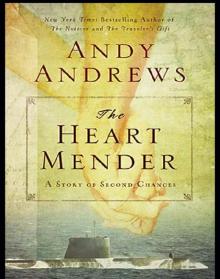 The Heart Mender: A Story of Second Chances
The Heart Mender: A Story of Second Chances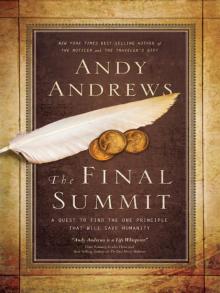 The Final Summit: A Quest to Find the One Principle That Will Save Humanity
The Final Summit: A Quest to Find the One Principle That Will Save Humanity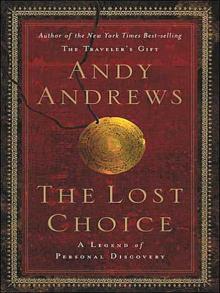 The Lost Choice
The Lost Choice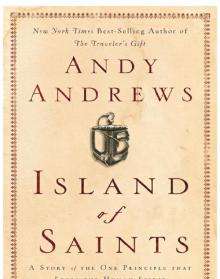 Island of Saints: A Story of the One Principle That Frees the Human Spirit
Island of Saints: A Story of the One Principle That Frees the Human Spirit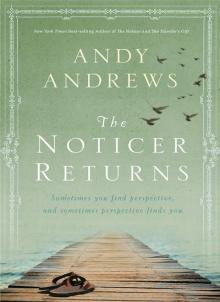 The Noticer Returns
The Noticer Returns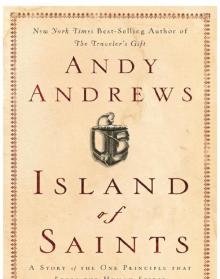 Island of Saints
Island of Saints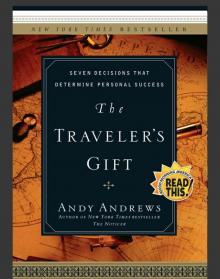 The Traveler's Gift
The Traveler's Gift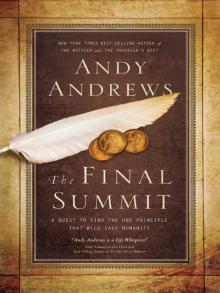 The Final Summit
The Final Summit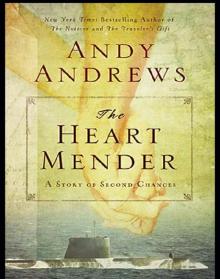 The Heart Mender
The Heart Mender